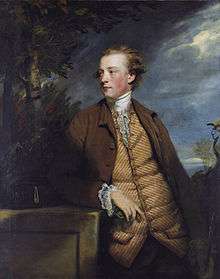Denis Daly (died 1791)
Denis Daly (1748 – 10 October 1791) of Carrownakelly and Dunsandle, Loughrea, County Galway, was an Irish landowner and politician.

Biography
His father was James Daly of Carrownakelly and Dunsandle in County Galway, and his mother was Catherine Gore, daughter of Sir Sir Ralph Gore, 4th Baronet and his second wife Elizabeth Ashe. His siblings included St George Daly, judge of the. Court of King's Bench (Ireland). He was the great-grandson of Denis Daly, judge of the Court of Common Pleas (Ireland). Though traditionally Roman Catholics, and of Gaelic origin, the Dalys had been able to hold on to their lands by converting to the Protestant faith and forsaking their allegiance to the Stuart dynasty.
He was educated at Christ Church, Oxford, but there is no record of his taking a degree there.
Daly owned estates in County Mayo, County Galway, County Clare, and County Limerick. He had to sell off half of these estates to pay his debts, but on his marriage to Lady Henrietta Maxwell, the only daughter of Robert Maxwell, 1st Earl of Farnham and Henrietta Cantillon, widow of the 3rd Earl of Stafford, his fortunes once again increased. His family residence was Carrownakelly Castle, in the parish of Kiltullagh, where the Dalys had lived for several generations, but he moved some four miles south towards Loughrea where he built Dunsandle House, sometime in the mid-18th century. In 1769 and 1772 he served as Mayor of Galway.
Political career
Daly was a friend of Henry Grattan, who had a great respect for his political skills, and like him sat in the Irish House of Commons. Between 1767 and 1768, he was Member of Parliament for Galway Borough. Subsequently, he represented Galway County until 1790, and then again Galway Borough until 1792. In 1783, he was also elected for the latter constituency, but chose not to sit. He never held high Ministerial office but was appointed Muster Master General. He was a fine orator but did not often speak in Parliament; when he did it was usually from a carefully prepared script.
Character
He had a reputation for laziness, but he was intelligent, good humoured and a fine classical scholar. Grattan called him one of the best and brightest characters Ireland ever produced, and said that his early death was a tragedy for his country. Grattan even suggested that Daly's wisdom and moderation, had he lived, might have prevented the Irish Rebellion of 1798.
Family
His eldest son James represented Galway County in the Parliament of the United Kingdom and was later raised to the peerage. A younger son, Robert, was a leading Irish evangelical who became Bishop of Cashel and Waterford. He also had six daughters. His widow died at a great age in 1852.
References
- Stephen, Leslie, ed. (1888). . Dictionary of National Biography. 13. London: Smith, Elder & Co.
- The Lords of Dunsandle, James Noel Dillon, in Kiltullagh/Killimordaly: As the Centuries passed: A history from 1500-1900, pp. 43–67, ed. Kieran Jordan, 2000.
- Clare bards, Galway gentry, Patrick Melvin, The Irish Genealogist, 2002
- The Daly Chronicle, Dermot Daly,The Irish Genealogist, 2002
| Parliament of Ireland | ||
|---|---|---|
| Preceded by John Eyre Hon. Richard FitzPatrick |
Member of Parliament for Galway Borough 1767–1768 With: John Eyre |
Succeeded by James Daly Robert French |
| Preceded by Charles Daly Richard Trench |
Member of Parliament for Galway County 1768 – 1790 With: Henry de Burgh, Lord Dunkellin 1768 William Power Keating Trench 1768–1790 |
Succeeded by William Power Keating Trench Joseph Henry Blake |
| Preceded by Denis Bowes Daly Anthony Daly |
Member of Parliament for Galway Borough 1783 With: Denis Bowes Daly |
Succeeded by Denis Bowes Daly Anthony Daly |
| Preceded by Anthony Daly Denis Bowes Daly |
Member of Parliament for Galway Borough 1790–1792 With: Sir Skeffington Smyth, 1st Bt |
Succeeded by Peter Daly Sir Skeffington Smyth, 1st Bt |